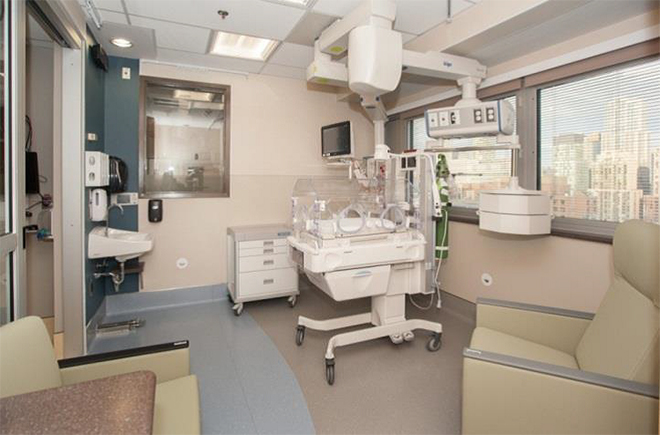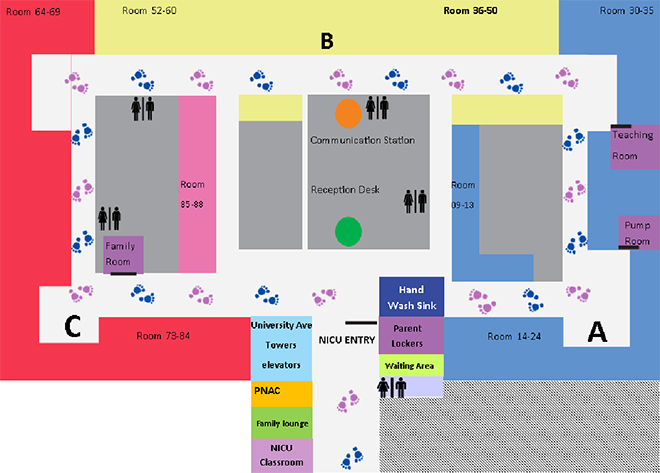What to Expect in the NICU
We appreciate that this can be a very stressful time for you and your family. Your bedside nurse will guide you as to how you can best be involved in your baby’s care. We offer regular education sessions for parents and invite you to participate in our morning bedside rounds, so that you can contribute to your baby’s plan of care. Please ask your health-care team about more ways you can be involved.
Family Integrated Care
Mount Sinai Hospital developed Family Integrated Care (FICare) model where parents are viewed as an integral part of the NICU team providing active care for their infant, instead of being in a passive support role. We encourage parents to take care of their infant while in our unit and become primary caregivers for their infant in the NICU.
Several studies have suggested that parents can play a larger role in providing direct care of infants in the NICU and that there are many short and long-term benefits of this practice. The ultimate goal of FICare is to support parents in becoming engaged as part of their infants care team, becoming empowered, comfortable, and confident in caring for their baby in the NICU. During their participation in the FICare program, parents learn how to provide care for their infants in the NICU, while the nurses became educators and coaches for the parents
Research suggests that infants admitted to the NICU and cared for under the FICare model grow faster and have less stress, spend fewer days in the NICU, and are less likely to be readmitted to hospital after discharge, compared to infants cared for primarily by staff. These infants are also more likely to be breastfed and for a longer time, which provides a host of long-term health benefits.
The goal of Family Integrated Care is to partner you with your nurse and the medical team which will help you feel more confident and comfortable caring for your infant. We hope that by the time your baby is transferred to another hospital, or discharged home, you will feel more secure taking care of and understanding the needs of your baby.
Morning Medical Rounds
If you are present and participate in medical rounds, you will have a better understanding of the care that is provided to your baby. These rounds occur every day in the morning.
Parenting Your Baby
With the support provided by your baby’s nurse you will learn to feel more comfortable caring for your baby and holding your baby skin-to-skin as much as possible. The medical team, especially the nurses, will continue to act as coaches to assist you in taking over most the care of your baby as your baby gets better and closer to discharge or transfer to another hospital.
Track your involvement in your baby’s care and his/her progress with these tools:
Your Baby’s Room and Facilities
- Every baby in the NICU has a private room.
- Your baby room can be located in one of the three zones A, B or C.
- Most rooms have a bench at the back that you can sleep on or a comfortable chair, and we can provide screens if you want privacy for pumping, sleeping or reflecting.
- For infection control reasons only water in Styrofoam cups is permitted in your baby's room.
- There are water and ice machines in the hallway; your baby's nurse can show you where they are.
- Please use the family lounge for meals and snacks.
- We have 2 locker spaces. One outside of the unit and one inside parents lounge. Please leave your coats and oversize luggage items in a locker prior to entering the unit.
- For your baby's safety, the NICU is a protected unit that has a secured access for entry. Parents are recognized as being an important part of our team and therefore we provide keyless access during your stay in the NICU. Upon your first visit to the NICU, please introduce yourself to the unit clerk who will ask for your ID and will set up your keyless access.
- A breast pumping room is located in zone A, Room 17-025. It is a mother-only room, and any mother who has been discharged from hospital may use it. Ask your baby's nurse for the location and entry code. You are also welcome to pump in your baby’s room and we will provide screen to ensure your privacy
- You are welcome to use our parent lounge, Room 17-205, (located in the hallway outside of the unit), with a microwave and television for your use. Ask your baby's nurse for the entry code.
- Two care by parent rooms and 4 sleep rooms are available for parents to stay overnight, to meet special needs, such as to be close to their baby, or to prepare for caring for your baby at home.
- Because babies who are being cared for in the NICU need special medical attention, you will see many pieces of equipment in the room. This may be overwhelming at first, but be assured that the equipment helps us deliver the best possible care for your baby. Your baby's nurse will help you familiarize yourself with all of the equipment.


2 care-by-parent rooms
These are specially designed rooms to simulate home experience so that parents can have a “test run” before taking your baby home from the NICU. You will have a nurse assigned to your infant yet have the sense that you are on your own, with help only a phone call away. Check out time is 10am, unless you are staying an additional night. Check-in time may be discussed with your infant’s nurse.
Each room has:
- A double bed with sheets, blankets and pillows.
- A bathroom including a shower; towels and face clothes.
- A phone in the room to dial to the NICU should you need assistance.
- If you need to leave the room, we ask that you bring the baby back to the nursery to be monitored.
Please bring your own food, there is none provided.
4 Sleep Rooms
These are available for parents to stay overnight, to meet special needs including overnight breastfeeding or needing to be on-site for a critically ill baby. Located on the 17th floor, near the NICU, we prioritize the use of those rooms based on the urgency of the request. Check out time is 10am, unless you are staying an additional night. Check-in time may be discussed with your infant’s nurse.
Speak to a nurse caring for you and your infant to request a room. If no rooms are available, you will be put on a waiting list and you can discuss options for alternate arrangements.
You may be asked to leave the room if there is an urgent request for a family due to special circumstances. Depending on your need, we will make every effort to make alternative arrangements for you.
Each room has:
- A single bed with sheets, blankets and pillows.
- A bathroom including a shower; towels and face clothes.
Please bring your own food, there is none provided.
Infection Prevention and Control
Infection Control is a hospital-wide program at Mount Sinai that minimizes the risk of infection to patients, staff and visitors.
Prevention of infections in the low birth weight infant requires all staff, families and visitors to pay special attention to patient care practices and to employ health standards. Below is important information for you and your family to help prevent infections.
Hand washing is the most important part of hand hygiene and is something we can all do to prevent infection from spreading. Before you enter the nursery, please wash your hands thoroughly with the soap and water in the dispenser at the sink. Wash every part of your hands – the front, back, between the fingers and your thumbs. Make sure your nails and nail beds are clean. Wash a little above your wrists and point your hands downward toward the sink so the germs can run off into the sink. Once you start washing your hands, continue for at least 15 seconds. Rinse off all the soap and dry your hands well.
Always clean your hands with alcohol based hand rub or soap and water:
- Before and after you touch your baby (and between babies, if you have more than one.) Please avoid touching any other baby in the nursery.
- After touching any area of your body that has a lot of germs – your nose, or mouth, head and hair, and after going to the bathroom.
- When you leave the nursery for a break, wash your hands each time you come back. Avoid handling your baby if you have a rash or open sores on your hands.
- Moisturize hands after leaving baby’s environment and as often as possible to prevent irritation of the skin.
- Artificial nails and nail polish are not recommended as they are a reservoir for bacteria and are very difficult to keep clean.
In order to protect your baby, we need ongoing information about your exposure to common health problems. You will be asked some questions by the nursing staff about fevers, rashes or flu, etc.
If you or anyone who has visited your baby experience any of the following, please avoid coming to see your baby, and phone the NICU immediately:
- Fever
- Diarrhea
- Vomiting
- Rash
- Cough
- Sore throat
- Runny Nose
- Itchy eyes
Please let us know if:
- you have been in contact with someone who has chicken pox or measles.
- you have been in contact with someone who developed those conditions within a week of seeing them.
- if you or another visitor has developed the condition within one week of a visit to the NICU.
We will consult with the Infection Control Department and a decision will be made regarding your access to the NICU to see your baby.
Respiratory Syncytial Virus (RSV) is a virus affecting the lungs. When you catch RSV, it is like having a cold or flu with a runny nose, cough and fever. Most babies will catch colds caused by RSV before they are 3-years old.
- How to Protect your baby from Respiratory Syncytial Virus (RSV).
- Additional information about RSV available here.
While in the NICU your baby may have different types of procedures. Some procedures may be sterile and you may be asked not to enter the room until the procedure is done. You may seek information from another staff member as to how long the procedure may take and wait in the family room or family lounge.
Security
For your baby's safety, the NICU is a protected unit that has a secured access for entry. Parents are recognized as being an important part of our team and therefore we provide keyless access during your stay in the NICU. Upon your first visit to the NICU, please introduce yourself to the unit clerk who will ask for your ID and will set up your keyless access.
There is a different procedure for visitors. They will need to call in to the unit from the phone outside the door to check in with the Ward Clerk. All visitors are to be accompanied by at least one parent at the bedside.
Parents and visitors are reminded to keep valuables at home. There are a few lockers available outside of the nursery for your use. Please bring your own lock.
Security personnel frequently patrol the 17th floor and surveillance equipment is installed throughout the Hospital.





